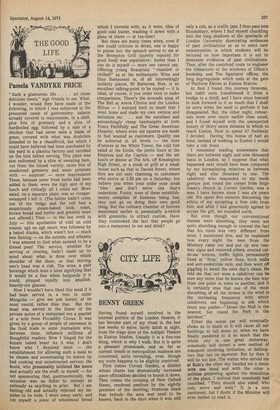BENNY GREEN
Having found myself involved in the internal politics of the London theatre, it has become part of my ritual in the last few weeks to move, fairly latish at night, from the stage door of the Adelphi Theatre to Euston Station. Usually it is a fine-run thing, which is why I walk. But it is quite a pleasant promenade, and so far as current trends in metropolitan madness are concerned, quite revealing, even though my route happens to be slightly contrived.
First comes Covent Garden, a district whose charm has dramatically increased since officialdom decided to knock it down. Then comes the crossing of New Oxford Street, rendered perilous by the nightly presence of the snorting, frumious beast that befouls the area and used to be known, back in the days when it was still only a cub, as a traffic jam. I then pass into Bloomsbury, where I find myself chuckling into the long shadows at the spectacle of London University desecrating evidences of past civilisations so as to erect new monstrosities in which students will be lectured on how important it is not to desecrate evidences of past civilisations. Then, after the contrived route to engineer the climacteric of the windows of Dillon's bookship and The Spectator offices, the long degringolade which ends at the gate of Platform Eleven at Euston Station.
At first I found this journey tiresome, but habit soon transformed it from a trudge to a stroll, and I have since learned to look forward to it so much that I shall be sorry when the need to perform it has disappeared. But, the other night, rehearsals were over much earlier than usual, and I found myself with the unexpected luxury of thirty extra minutes in which to reach Euston. How to spend it? Suddenly I decided. Having this bonus of half an hour, instead of walking to Euston I would take a cab there.
I remember reading somewhere that there are between eight and nine thousand taxis in London, so I suppose that what happened next would have been computed by my horseplaying relatives at between eight and nine thousand to one. The cabdriver who responded to my meek gesture just round the corner from Inigo Jones's church in Covent Garden, was a man I have known since I was six years old. We spent five minutes discussing the ethics of my accepting a free ride from him, and after I had generously agreed to accept the gift, we trundled north.
But even though our conversational themes were absorbing, they were not quite absorbing enough to conceal the fact that his route was very different from mine. I mentioned this, and he explained how every night the men from the Ministry came out and put up new oneway signs and removed others, erected culde-sac notices, traffic lights permanently fixed at Stop,' yellow lines, brick walls and anti-pedestrian rails, and then went off giggling to await the next day's chaos. He told me that not even a cabdriver can be sure any more that he knows the best way from one point in town to another, and it is certainly true that one of the most disturbing of all the straws in the wind is the increasing frequency with which . cabdrivers are beginning to ask which route you prefer—" Down the Mall is the nearest, but round the Park is the quickest."
Either the motor car will eventually choke us to death or it will cause all our buildings to fall down or, when we have finally pandered to it so much that the whole city is one great motorway, somebody will invent a new method of transport involving levitation, or helicopters that run on tapwater. But by then it will be too late. The waiter who served me at Rule's the other day handed me a menu with one hand and with the other a petition protesting against the demolition of the place. I noticed that somebody had inscribed, "They should also stand, who only serve and wait." It is a nice sentiment, but I doubt if the Minister will even bother to read it.


































 Previous page
Previous page